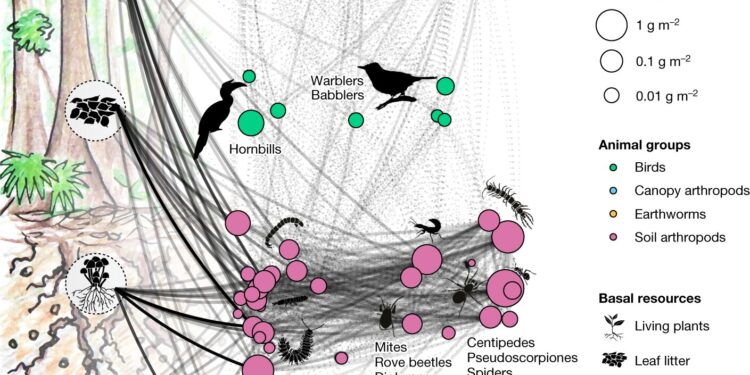Energy distribution among birds, earthworms and arthropods in rainforest food webs in above-ground and below-ground compartments. Credit: Nature (2024). DOI: 10.1038/s41586-024-07083-y
Conversion of rainforest to plantations erodes and restructures food webs and fundamentally changes how these ecosystems function, according to a new study published in Nature. The results provide the first insights into energy processing in soil and canopy animal communities in tropical mega-biodiversity ecosystems.
Every day, new areas of tropical forests are converted to plantations, radically changing tropical biodiversity and ecosystem functioning. Yet current understanding of the consequences is fragmentary: previous studies tended to examine either biodiversity or the ecosystem.
An international research team led by the Universities of Göttingen in Germany and Bogor in Indonesia in collaboration with the German Center for Integrative Biodiversity Research (iDiv) and the University of Leipzig (UL) brings these threads together in this study. They analyzed organisms ranging from microscopic mites and earthworms in the soil to beetles and birds in the tree canopy, comparing the tropical rainforest to the rubber and oil palm plantations of Sumatra, Indonesia.
Researchers set out to study both biodiversity (plants, insects, vertebrates) and changes in the functioning of food webs (biomass, trophic structure, energy flow).
To do this, they estimated the abundance and biomass of the following: arthropods (such as spiders, insects, mites and centipedes) in the tree canopy using a technique known as “misting”; birds using audio recorders and observation at specific points; and soil arthropods and earthworms from soil cores. This information was collected on 32 sites representing tropical forests or plantations.
They analyzed their results using existing models of dietary traits and preferences to reconstruct food webs at each site and across animal groups.
Energy distribution in the above-ground and below-ground compartments of tropical forest and plantation food webs. Credit: Nature (2024). DOI: 10.1038/s41586-024-07083-y
The results were used to measure the distribution of energy and consumption of different resources (living plants, litter, bacteria, fungi, soil organic matter, other animals) in food webs above and below ground. . This method takes decomposition into account and quantifies the actions of predators (such as certain spiders or birds) in food webs.
Scientists have identified that most of the energy in rainforest animal communities goes to arthropods in soil food webs. Plantations, on the other hand, had a very different energy distribution: food webs in canopies were less rich and complex, and food webs in soil were also modified.
Instead of diverse arthropod communities, virtually all energy was allocated to invasive earthworm species. As a result of these changes, there was generally little predation and relatively high numbers of plant-feeding insects (such as caterpillars and beetles) in plantations.
“It’s fascinating to see how all these different organisms are connected, from tiny arthropods to birds, from soils to canopies. Scientists clearly need to study these connections in different parts of the ecosystem, especially in threatened biodiversity areas, like the one below our feet,” said Anton Potapov, first author of the study, who was at the University of Göttingen during the data collection and later led the junior research group Biodiversity and Soil Functions at iDiv and UL.
“The current conversion of rainforest to plantations not only causes a massive decline in biodiversity, but it also changes the functioning of these ecosystems,” explains Professor Stefan Scheu, lead author and head of the Department of Animal Ecology at the University of Göttingen.
“For sustainable management of converted ecosystems, we need to understand how all of these linked elements and connections are impacted. A more holistic approach can then be developed to promote ecosystem functioning both above and below ground.”
More information:
Anton M. Potapov et al, Rainforest transformation reallocates energy from green to brown food webs, Nature (2024). DOI: 10.1038/s41586-024-07083-y
Provided by the German Center for Integrative Biodiversity Research (iDiv) Halle-Jena-Leipzig
Quote: Conversion of rainforest to plantations impacts food webs and biodiversity, according to study (February 20, 2024) retrieved February 20, 2024 from
This document is subject to copyright. Apart from fair use for private study or research purposes, no part may be reproduced without written permission. The content is provided for information only.



